-

新人教版高中英语必修2Unit 3 The Internet-Discovering Useful Structure教案一
This unit is about the Internet, which has a great influence to our humans and our lives. During the Listening & Speaking & Talking and Reading and Thinking section, the influence in examples has been shown. Thus, use the Present Perfect Tense is appropriate. However, in order to show the justice or weaken the doer of the behavior/action, it’s better to use the Present Perfect Passive Voice than the Present Perfect Tense. Besides, having learned to use the Present Perfect Passive Voice, students can beautify their language in their writing. 1. Learn the structure of the Present Perfect Passive Voice and its functions. 2. Learn to change the sentences with the Present Perfect Passive Voice into the sentences with the Present Perfect Passive Voice. 3. Learn to write sentences with the Present Perfect Passive Voice flexibly according to the context. 1. Learn the structure of the Present Perfect Passive Voice and its functions. 2. Learn to change the sentences with the Present Perfect Passive Voice into the sentences with the Present Perfect Passive Voice. 3. Learn to write sentences with the Present Perfect Passive Voice flexibly according to the context. Step 1 Observe the following sentences, then change the sentences into passive voice.He has been selected to take part in the sports meeting.(肯定句)他已被挑选出来参加运动会。The ink has not been removed from his overcoat.(否定句)墨迹还没有从他外套上去掉。

新人教版高中英语必修2Unit 3 The Internet-Listening &Speaking&Talking教案一
Listening and Speaking introduces the topic of “ask about online habits”. Many middle school students have been surfing the Internet for many years, but what they do with the Internet and how much time they spend every day may not be very clear to themselves, nor to other students. This section allows students to investigate their peers' Internet use, which is conducive to their mutual understanding and understanding of the Internet. It can also help them reflect on their own online behavior, learn from other people's good online habits, and get rid of their bad online behavior.The listening text of this section is an investigation interview. The investigators interview specific groups with the same questions to obtain information, so as to understand their views, practices or attitudes on this issue. There are two specific questions: “how much time do you spend online every day? What do you usually do online?”. The answers of the three respondents provide rich and different information, and achieve the purpose of the investigators. The oral discourse structure of survey interviews generally includes greeting and explaining the purpose of the interview, presenting the interview questions and the respondents' answers. Listening and Talking introduces the theme of “choosing the right application ". Listening text is a conversation between Laura and Xiao Bo. In this part of listening, “oink”; “piggy bank” may cause the students' hearing comprehension limitation. Oink refers to sound word and pig's sound. So, add some oink to my piggy bank is often used to describe "making a little money".1. Guide students to understand the content of listening texts in terms of listening for definitions.2. Cultivate students' ability to define words and understand an investigation interview.

新人教版高中英语必修2Unit 3 The Internet-Reading and Thinking教案一
Paragraph 3. Jan decided to start an IT club to teach old people how to use computers and the Internet. Paragraph 4. Jan has started taking online classes to learn more about how to use the Internet to make society better. Paragraph 5. Jan’s life has been greatly improved by the Internet. Step 5: Critical thinking:(1)How do you arrange your time spent on study and the Internet? Is it reasonable? I usually surf the Internet using my mobile phone for only an hour after class, and it is reasonable for me.(2)What are your online activities? Are they safe? I chat with my friends, read news and play games. I never give away my private information so I think they are safe.Step 4: summary Much has been written about the wonders of the World Wide Web. There are countless articles (1)______(tell) us how the Internet has made our lives more convenient. But the Internet has done a lot (2)_____(much) for people than simply make life more convenient. People’s lives (3) _________________(change) by online communities and social networks so far. Take Jan for example, who developed a serious illness that made her (4)_____(stick) at home with only her computer to keep (5)___(she) company. She joined an online group (6)______ she could share problems, support and advice with others. She considered the ability to remove the distance between people as one of the greatest (7)_______(benefit). She was so inspired (8)____ she started an IT club in which many people have been helped. She has started to learn more about how to use the Internet to make society better. Her next goal is to start a charity website to raise money (9)___ children in poor countries. Jan’s life has been (10)______(great) improved by the Internet. Step 5 Homework:Review what we have learned and find out the key language points in the text.

新人教版高中英语必修2Unit 3 The Internet-Reading for Writing教案二
8. However, the more polite you are, the less likely it is you will be attacked. 然而, 你越有礼貌, 你被攻击的可能性就越小。 Step 8 Writing---the articleHow to stay safe in the online chat roomToday I thought I’d blog about a question that has been asked many times--- how do you stay safe online and avoid bad experiences in the online chat room ? I’m not an expert, but many years as a blogger have taught me a thing or two.First of all, there’s the golden rule of the Internet: keep out of what makes you uneasy. Don’t post comments or click on anything. Second, protect your privacy. Don’t give out too much private information like your address, phone numbers, the ID numbers, etc. Third, be polite. If you are polite to others on the Internet, you won’t be attacked in normal situation. Finally, don’t believe in others easily and never meet someone you met online alone. It is very dangerous.Have you had any bad experiences online, or do you have some good advice for staying safe? Post your comments below!Step 9 Pair workExchange drafts with a partner. Use this checklist to help your partner revise his/her draft.1. Does the writer tell the reader what he/she know about the topic ?2. Are the tips and suggestions well organised ?3. Has the writer defined the new words ?4. Does the author include examples, comparison, or explanations ?5. Does the writer end by asking readers to leave comments and/or suggestions ?6. Can you find any grammar or spelling mistakes.Step 6 HomeworkPut up your revised draft in the classroom or read it to your class.
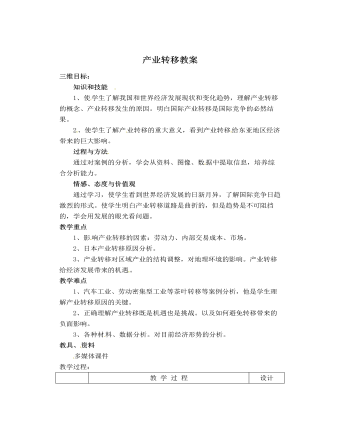
人教版高中地理必修3产业转移教案
1.国家石油价格上涨,导致依赖于国际石油而建立起来的日本重化工业的制造成本提高,产品价格相应提高,削弱了日本重化工产品在国际市场上的竞争力。2.日元 的大幅度升值,意味着日本产品在国际市场上的价格大幅度提高。例如,同样的日本产品,如果原来在国际市场上卖1美元,日元升值1倍后其在国际市场上的售价就达2美元。所以,以国际市场为依托的日本传统产业只好纷纷向海外转移。3.自身市场满足不了发展需求,国际市场上亚洲发展中国家和地区的同类产品具有明显的价格优势。所以,日本企业在其国内发展的空间很小。4.劳动力价格高反映为产品的价格高,而劳动力数量又满足 不了企业进一步扩展对劳动力的需求。所以,日本从事传统产业的国内企业生产受劳动力价格和数量的双重制约。5.促进日本企业生产的区位选择向国土的南、北部和海外扩展。6.“技术立国”的政策明显对传统产业在国内生产不利,即企业生产要么向知识技术密集型转换(这需要大量的投资),要么转向海外。
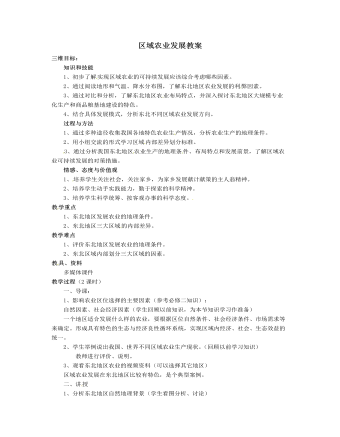
人教版高中地理必修3区域农业发展教案
1.归纳珠江三角洲发展基塘生产有利的地理条件。珠江三角洲地势低平,河网密布,降水充沛。北回归线从珠江三角洲的北部穿过。珠江三角洲地区发展基塘农业生产有利条件可以结合材料,归纳为三个方面:地形、气候、市场(当地和海外)。2.基塘生产将哪些产业联系起来?哪些副产品(或废弃物)被充分利用起来?这种联系对农村经济发展有什么作用?基塘生产环节将种植业(桑、蔗等)、养殖业(养蚕、养鱼)、工业(丝厂、糖厂)等几种产业紧密的联系在一起。在此环节中,塘泥、蚕沙(蚕屎)、蚕蛹、缫丝、滤泥、蔗叶等副产品被充分的回收利用。养蚕业、蔗糖加工业同塘鱼养殖业紧密结合,作为一种综合的经营,几者之间相互依存、相互促进、扬长补短,有机地循环联系起来。基本上解决了桑、蔗的肥料和蚕、鱼的饲料问题。不仅养蚕、蔗糖加工和养鱼生产稳定,而且成本也大大降低。

人教版高中地理必修3区域工业化与城市化教案
知识和技能 1、 了解区域工业化和城市化之间的关系,以及它们对区域社会经济发展所起的作用 。2、分析导致珠江三角洲工业化和城市化快速推进的诸多思想束缚,并通过比较,认识到对外开放政策是其中的关键因素。3、 比较珠江三角 洲的 区工业化进程的两个主要阶段,归纳出不同时期的主要发展特点,并能够结合具体案例分析工业化进程对城市化的巨大推动。 4、分析珠江三角洲地区工业化和城市化进程中的问题,并尝试评价目前的一些调整措施和发展方向。5、通过分析我国珠江三角 洲地区工 业化、城市化的发展阶段、问题与对策,了解区域工业化和城市化的推进动力和发展规律。过程与方法 利用扮演不同的社会角色来谈对珠江三角洲地区未来经济和城镇发展的设想和建议,反馈学生知识、能力、价值观发展情况和效果, 培养学生对所学所得的运用能力,并为学生的创新精神的发 展营造有利氛围。情感、态度与价值观1、通过鼓励学生主动获 取资料的做法,关注学生实践能力、综合思维能力及终身学习能力的训练。
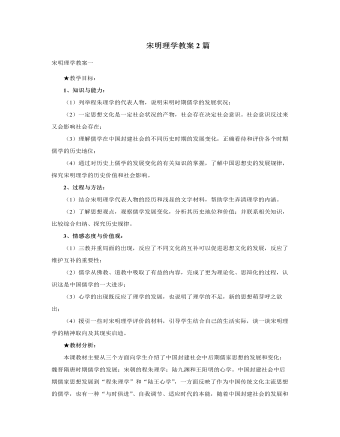
人教版高中历史必修3宋明理学教案2篇
二、程朱理学:1、宋代“理学”的产生:(1)含义:所谓“理学”,就是用“理学”一词来指明当时两宋时期所呈现出来的儒学。广义的理学,泛指以讨论天道问题为中心的整个哲学思潮,包括各种不同的学派;狭义的理学,专指程颢、程颐、朱熹为代表的,以“理”为最高范畴的学说,称为“程朱理学”。理学是北宋政治、社会、经济发展的理论表现,是中国古代哲学长期发展的结果,是批判佛、道学说的产物。他们把“理”或“天理”视作哲学的最高范畴,认为理无所不在,不生不灭,不仅是世界的本原,也是社会生活的最高准则。在穷理方法上,程颢“主静”,强调“正心诚意”;程颐“主敬”,强调“格物致知”。在人性论上,二程主张“去人欲,存天理”,并深入阐释这一观点使之更加系统化。二程学说的出现,标志着宋代“理学”思想体系的正式形成。【合作探究】宋代“理学”兴起的社会条件:

新人教版高中英语必修2Unit 3 The Internet-Listening &Speaking&Talking教案二
From the pictures in the text and the title--- choose the best app, we can know that this part is about how to save money by using apps.Step 2 While-listening1. Laura and Xiao Bo are talking about apps. Listen to their conversation and find out what apps they want.Xiao Bo is looking for a(n) exercise app to help him get in shape.Laura would like an app for getting rich and another that will make her grades better.2. Listen again. Are the sentences true T or false F?1). Both of Xiao Bo's apps keep track of the steps he takes._____2). Xiao Bo's second app can help him make a fitness plan._____3). Laura needs an app that will help her get discounts.______4). Laura needs an app that will add money to her bank account._______F T F T3. Listen once more and tick the sentence you hear. Underline the words used to express predictions, guesses, and beliefs.Predictions, Guesses, and Beliefs________It might help me walk more.________My guess is that it wouldn't work.________I imagine this app would help me get fit faster________I suppose that would be good.________I guess you could save a little with this app.________I suppose there would be some problems, too.________I believe this app could help me get thinner.
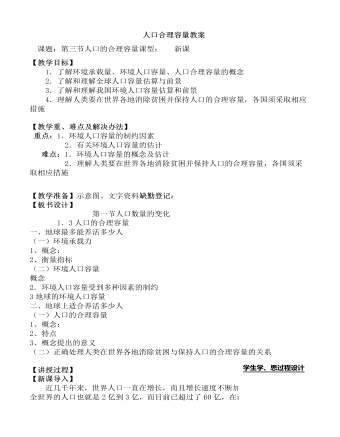
人教版高中地理必修2人口合理容量教案
(1)请同学们结合日常生活实例和教材分析说明人类要在世界各地消除贫困并保持人口的合理容量任务的艰巨性?(2)采取何种措施才能更好的解决这一问题的出现?教师总结(1)现实中的人口问题(如人口过快增长、人口城市化和人口老龄化等)引发了严重的资源问题和环境问题。①发达国家的人均消耗资源量很大,索取资源和转嫁有害生产的地域超出了本国的范围。②发展中国家不仅人口数量多,人均消费水平低,而且一些国家的人口仍在快速增长。若在现有的经济基础上,把发展中国家人均生活质量提高到与发达国家相当的水平,所引发的资源短缺和环境问题将会相当严重,解决的难度也很大。(2)I就整个世界来说:①国际社会要倡导各国,尤其发展中国家要尽最大可能把人口控制在合理的规模之内;②建立公平的秩序,保证大多数人拥有不断追求高水平生活质量的平等权利。
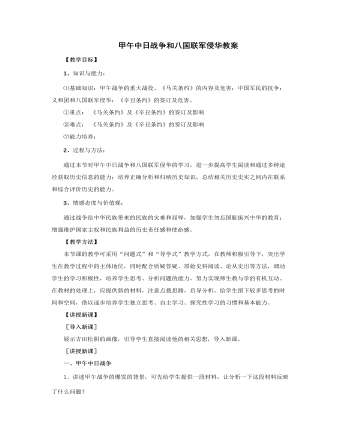
人教版高中历史必修1甲午中日战争和八国联军侵华教案
(1)巨额的赔款,是列强对中国空前的大规模勒索;为支付这笔巨额赔款,清政府加紧搜刮人民,使人民生活更加贫困,社会经济更加凋敝。(2)在北京设立的“使馆界”,实际上是“国中之国”,是帝国主义策划侵略中国的大本营。外国侵略者控制京津地区,使清政府完全处于外国军队的控制之下,便于侵略者直接派兵镇压中国人民的反帝斗争。(3)按照条约规定,清朝官吏严厉镇压中国人民的反帝斗争,进一步成为帝国主义的帮凶。(4)改设外务部的规定,便于清政府能够按照外国侵略者的意旨实行卖国的外交政策。《辛丑条约》是帝国主义强加给中国的一个严重的不平等条约,列强除了穷凶极恶地对中国敲诈勒索外,还重新确立了以慈禧太后为首的清政府继续充当它们在华的代理人。
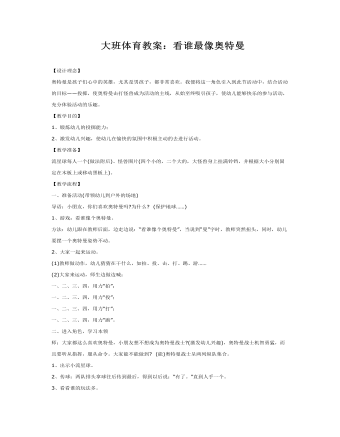
大班体育教案:看谁最像奥特曼
【教学目的】1、锻炼幼儿的投掷能力;2、激发幼儿兴趣,使幼儿在愉快的氛围中积极主动的去进行活动。【教学准备】流星球每人一个(做法附后)、怪兽图片(四个小的,二个大的,大怪兽身上挂满铃铛,并根据大小分别固定在木板上或移动黑板上)。【教学流程】一、准备活动(带领幼儿到户外的场地)导语:小朋友,你们喜欢奥特曼吗?为什么? (保护地球……)1、游戏:看谁像个奥特曼。方法:幼儿跟在教师后面,边走边说:“看谁像个奥特曼”,当说到“曼”字时,教师突然扭头,同时,幼儿要摆一个奥特曼姿势不动。
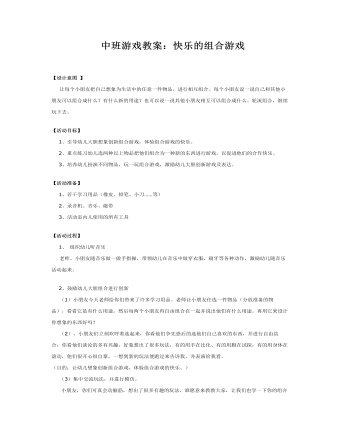
中班游戏教案:快乐的组合游戏
【活动目标】 1、引导幼儿大胆想象创新组合游戏,体验组合游戏的快乐。 2、重点练习幼儿选两种以上物品把他们组合为一种新的东西进行游戏,以促进他们的合作快乐。 3、培养幼儿扮演不同物品,玩一玩组合游戏,激励幼儿大胆创新游戏及表达。 【活动准备】 1、若干学习用品(橡皮、铅笔、小刀……等) 2、录音机、音乐、磁带 3、活动室内儿使用的所有工具 【活动过程】 1、 组织幼儿听音乐 老师、小朋友随音乐做一做手指操,带领幼儿在音乐中做穿衣服、刷牙等各种动作,激励幼儿随音乐活动起来。 2、鼓励幼儿大胆组合进行创新 (1)小朋友今天老师给你们带来了许多学习用品。老师让小朋友任选一件物品(分放准备的物品),看看它是有什么用途。然后每两个小朋友再自由组合在一起并说出他们有什么用途。再用它来设计你想象的东西好吗? (2)、小朋友们立刻欢呼着选起来,你看他们争先恐后的选他们自己喜欢的东西,并进行自由结合,你看他们谈论的多有兴趣,好象想出了很多玩法,有的用手在比化、有的用脚在试探,有的用身体在滚动,他们很开心很自豪,一想到新的玩法便跑过来告诉我,并表演给我看。 (目的:让幼儿想象创新组合游戏,体验组合游戏的快乐。)
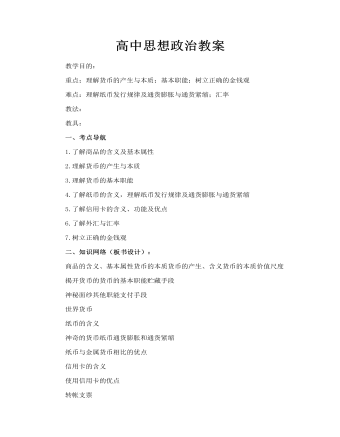
高中思想政治教案
一、考点导航 1.了解商品的含义及基本属性 2.理解货币的产生与本质 3.理解货币的基本职能 4.了解纸币的含义,理解纸币发行规律及通货膨胀与通货紧缩 5.了解信用卡的含义、功能及优点 6.了解外汇与汇率 7.树立正确的金钱观
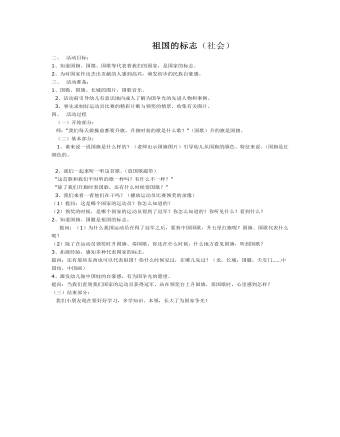
大班社会教案:祖国的标志
三、 活动准备: 1、国微、国旗、长城的图片,国歌音乐。 2、活动前引导幼儿有意识地向成人了解为国争光的先进人物和事例。 3、事先录制好运动员比赛的精彩片断与领奖的情景,收集有关图片。 四、 活动过程 (一)开始部分: 师:“我们每天做操前都要升旗,升旗时奏的歌是什么歌?”(国歌)升的旗是国旗。 (二)基本部分: 1、谁来说一说国旗是什么样的?(老师出示国旗图片)引导幼儿从国旗的颜色、特征来说。(国旗是红颜色的、 2、我们一起来听一听这首歌。(放国歌磁带) “这首歌和我们平时听的歌一样吗?有什么不一样?” “除了我们升旗时奏国歌,还有什么时候奏国歌?” 3、我们来看一看他们在干吗?(播放运动员比赛领奖的录像) (1)提问:这是哪个国家的运动员?你怎么知道的? (2)领奖的时候,是哪个国家的运动员得到了冠军?你怎么知道的?你听见什么?看到什么?
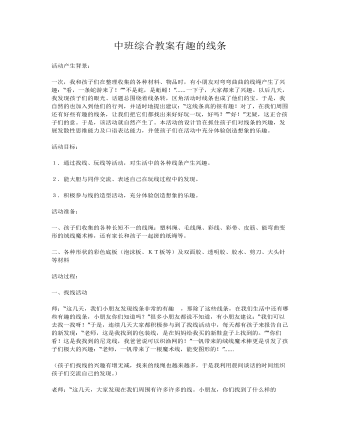
中班综合教案有趣的线条
活动目标:1.通过找线、玩线等活动,对生活中的各种线条产生兴趣。2.能大胆与同伴交流、表述自己在玩线过程中的发现。3.积极参与线的造型活动,充分体验创造想象的乐趣。活动准备:一、孩子们收集的各种长短不一的线绳:塑料绳、毛线绳、彩线、彩带、皮筋、能弯曲变形的绒线魔术棒,还有家长和孩子一起搓的纸绳等。二、各种形状的彩色底板(泡沫板、KT板等)及双面胶、透明胶、胶水、剪刀、大头针等材料活动过程:一、找线活动师:“这几天,我们小朋友发现线条非常的有趣 ,那除了这些线条,在我们生活中还有哪些有趣的线条,小朋友你们知道吗?”很多小朋友都说不知道,有小朋友建议:“我们可以去找一找呀!”于是,连续几天大家都积极参与到了找线活动中,每天都有孩子来报告自己的新发现:“老师,这是我找到的包装线,是在妈妈给我买的新鞋盒子上找到的。”“你们看!这是我找到的尼龙线,我爸爸说可以织渔网的!”一钒带来的绒线魔术棒更是引发了孩子们极大的兴趣:“老师,一钒带来了一根魔术线,能变图形的!”……(孩子们找线的兴趣有增无减,找来的线绳也越来越多,于是我利用晨间谈话的时间组织孩子们交流自己的发现。)老师:“这几天,大家发现在我们周围有许多许多的线。小朋友,你们找到了什么样的线?” (由于每个孩子都认真参与了找线的过程,他们讲述兴趣很高,讲起来有声有色,很多孩子都把在哪里找到的、和谁一起找到的讲得清清楚楚。在交流过程中还反映出,孩子们在找线过程中对一些线的名称及用途也有了一定程度的了解。)二、玩线活动(在孩子们找来了各种各样的线以后,我发现不仅孩子们相互间的交流没有终止,而且很多孩子已在进行玩线活动,而且非常的投入。为引导孩子们更好的探索,我就为孩子们提供了这一活动空间与时间 。)师:“今天我们就来玩玩我们找到的线,小朋友可以自己选线玩,玩的时候可以试试用不同的方法让它变成有趣的曲线,再讲讲它像什么。”(此活动,为了让孩子们在宽松、自由的氛围中玩线,我允许孩子可以在周围的操作桌上操作、也可以在活动室地板上自由操作。)其间,我注意引导幼儿尝试用不同的方法变出有趣的曲线图,并鼓励幼儿间的相互观察讲述。如当我发现有的孩子变出有趣的图形时,我以惊奇的口吻说:“你变出了什么有趣的东西呀?是怎么变出来的?”“你真能干!让我也来试试!”“你好朋友看到了吗,赶快告诉他!看他有没有你能干!”……
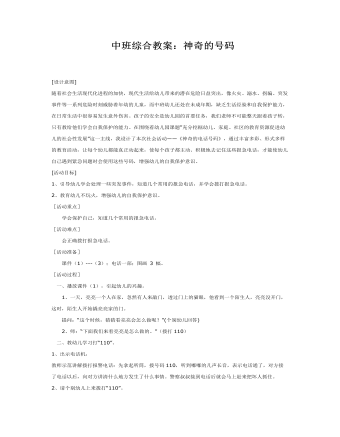
中班综合教案:神奇的号码
[活动目标]1、引导幼儿学会处理一些突发事件,知道几个常用的报急电话,并学会拨打报急电话。2、教育幼儿不玩火,增强幼儿的自我保护意识。[活动重点] 学会保护自己,知道几个常用的报急电话。[活动难点] 会正确拨打报急电话。[活动准备] 课件(1)---(3);电话一部;图画 3 幅。[活动过程] 一、播放课件(1),引起幼儿的兴趣。1、一天,亮亮一个人在家,忽然有人来敲门,透过门上的猫眼,他看到一个陌生人,亮亮没开门,这时,陌生人开始撬亮亮家的门。 提问:“这个时候,猜猜看亮亮会怎么做呢?”(个别幼儿回答)2、师:“下面我们来看亮亮是怎么做的。”(拨打110)
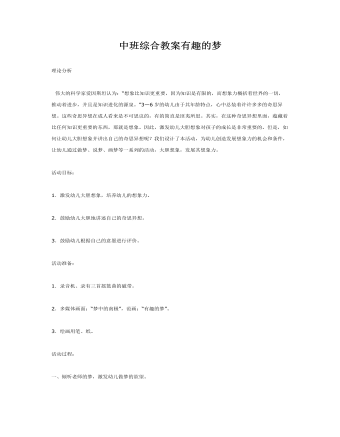
中班综合教案有趣的梦
活动目标:1.激发幼儿大胆想象,培养幼儿的想象力。2.鼓励幼儿大胆地讲述自己的奇思异想。3.鼓励幼儿根据自己的意愿进行评价。活动准备:1.录音机、录有三首摇篮曲的磁带。2.多媒体画面:“梦中的南极”,范画:“有趣的梦”。3.绘画用笔、纸。
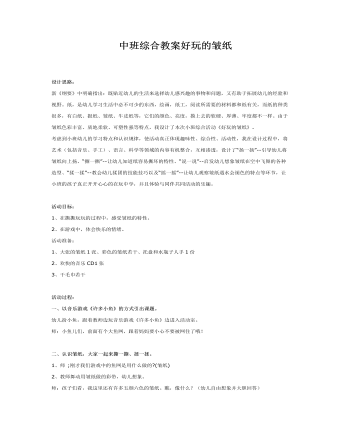
中班综合教案好玩的皱纸
活动目标:1、在撕撕玩玩的过程中,感受皱纸的特性。2、在游戏中,体会快乐的情绪。活动准备:1、大张的皱纸1张、彩色的皱纸若干、托盘和水瓶子人手1份2、欢快的音乐CD1张3、干毛巾若干 活动过程:一、以音乐游戏《许多小鱼》的方式引出课题。幼儿扮小鱼,跟着教师边玩音乐游戏《许多小鱼》边进入活动室。师:小鱼儿们,前面有个大鱼网,跟着妈妈要小心不要被网住了哦! 二、认识皱纸,大家一起来撕一撕、揉一揉。1、师 ;刚才我们游戏中的鱼网是用什么做的?(皱纸)2、教师舞动用皱纸做的彩带,幼儿想象。师:孩子们看,我这里还有许多五颜六色的皱纸。瞧,像什么?(幼儿自由想象并大胆回答)3、幼儿尝试着撕皱纸。A、师: 谁知道这细细长长的皱纸是怎么来的?(用小手撕出来的)B、请个别幼儿上来试试。C、教师提示:按照皱纸纹路撕出长条。4、幼儿操作
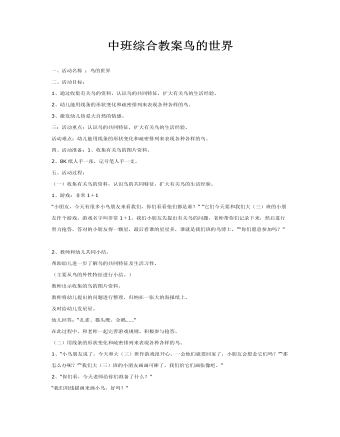
中班综合教案鸟的世界
2、幼儿能用线条的形状变化和疏密排列来表现各种各样的鸟。 3、激发幼儿热爱大自然的情感。 三:活动重点:认识鸟的共同特征,扩大有关鸟的生活经验。 活动难点:幼儿能用线条的形状变化和疏密排列来表现各种各样的鸟。 四、活动准备:1、收集有关鸟的图片资料。 2、8K纸人手一张,记号笔人手一支。 五、活动过程: (一)收集有关鸟的资料,认识鸟的共同特征,扩大有关鸟的生活经验。 1、游戏:非常1+1 “小朋友,今天有很多小鸟朋友来看我们,你们看看他们都是谁?” “它们今天要和我们大(三)班的小朋友作个游戏,游戏名字叫非常1+1。我们小朋友先提出有关鸟的问题,老师帮你们记录下来,然后进行智力抢答,答对的小朋友得一颗星,最后看谁的星星多,谁就是我们班的鸟博士。”“你们愿意参加吗?”